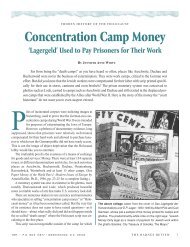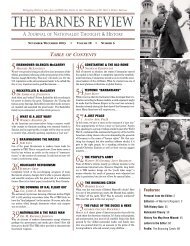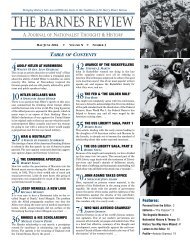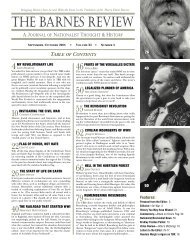You also want an ePaper? Increase the reach of your titles
YUMPU automatically turns print PDFs into web optimized ePapers that Google loves.
PAGE 28 the barnes review MAY/JUNE<br />
<strong>The</strong> labor pool of African kingdoms was<br />
always in need of replenishment. This was<br />
because nearly every slave sought to<br />
become free, and many managed to escape.<br />
Those who failed to escape and remained<br />
slaves did not maintain their numbers for<br />
very long. Grueling days under the tropical<br />
sun caused field slaves to have an exceedingly<br />
short life in Africa. For these reasons,<br />
warfare among African states increased, as<br />
more and more of them sent out large raiding<br />
parties to replenish their labor pool.<br />
<strong>The</strong> hostility created by this situation<br />
continues to this day, whereby some Afri -<br />
can countries have a small minority of<br />
wealthy elites who rule over a large mass<br />
of impoverished Africans. Usually, these<br />
groups consider themselves to be different<br />
ethnicities, and genocidal massacres commonly<br />
occur during uprisings even to this<br />
day. <strong>The</strong> holocaust of Rwanda, which<br />
occurred in the last decade of the 20th century,<br />
was considered newsworthy because<br />
of the large number of casualties involved,<br />
yet it was actually only one of many similar<br />
events that happen periodically<br />
throughout Africa. ❖<br />
FURTHER READING<br />
Cooper, Frederick, From Slaves to Squatters:<br />
Plantation Labor and Agriculture in Zanzibar<br />
and Coastal Kenya, 1890-1925, 1980.<br />
Cooper, Frederick, Plantation Slavery on the<br />
East Coast of Africa, 1977.<br />
Coupland, R., East Africa and Its Invaders,<br />
Oxford Press, 1974.<br />
Everett, Suzanne, History of Slavery,<br />
Brompton Books, 1991; reprinted Chartwell<br />
Books, 1993.<br />
Fisher, Allan, Slavery and Muslim Society in<br />
Africa, London: C. Hurst, 1970.<br />
Klein, Martin A., Breaking the Chains:<br />
Slavery, Bondage, and Emancipation in Modern<br />
Africa and Asia, Madison: University of<br />
Wisconsin Press, 1993.<br />
Harris, Joseph E., ed., Global Dimensions of<br />
the African Diaspora, 1993.<br />
Lovejoy, Paul E., ed., Africans in Bondage:<br />
Studies in Slavery and the Slave Trade, 1986.<br />
Lovejoy, Paul E., ed., <strong>The</strong> Ideology of Slavery<br />
in Africa, 1981.<br />
Lovejoy, Paul E., Transformations in Slavery:<br />
A History of Slavery in Africa, African Studies<br />
Series; 36. Cambridge [Cambridgeshire]; New<br />
York: Cambridge University Press, 1983.<br />
Manning, Patrick, Slavery and African Life:<br />
Occidental, Oriental, and African Slave Trades,<br />
1990.<br />
Miers, Suzanne and Kopytoff, Igor, Slavery in<br />
Africa: Historical and Anthropological<br />
Perspectives, 1977.<br />
Miers, Suzanne and Richard Roberts, eds.,<br />
<strong>The</strong> End of Slavery in Africa, 1988.<br />
Morton, Fred, Children of Ham: Freed Slaves<br />
and Fugitive Slaves on the Kenya Coast, 1873 to<br />
1907. African Modernization and Development<br />
Series. Boulder: Westview Press, 1990.<br />
Morton, Rodger Frederic, Slaves, Fugitives,<br />
and Freedmen on the Kenya Coast, 1873-1907,<br />
<strong>The</strong>sis—Syracuse University, 1976.<br />
Mowafi, Reda, Slavery, Slave Trade, and<br />
Abolition Attempts in Egypt and the Sudan,<br />
1820-1882, Lund Studies in International His -<br />
tory; 14, Scandinavian university books. [Stock -<br />
holm]: Esselte. Studium, 1981.<br />
Nwulia, Moses D.E., Britain and Slavery in<br />
East Africa, 1975.<br />
Robertson, Claire C., Women and Slavery in<br />
Africa, Madison, Wis.: University of Wisconsin<br />
Press, 1983.<br />
Samarin, William J., <strong>The</strong> Black Man’s<br />
Burden: African Colonial Labor on the Congo<br />
and Ubangi Rivers, 1880-1900, 1989.<br />
Savage, Elizabeth, <strong>The</strong> Human Commodity:<br />
Perspectives on the Trans-Saharan Slave Trade,<br />
London: F. Cass, 1992.<br />
Searing, James F., West African Slavery and<br />
Atlantic Commerce: <strong>The</strong> Senegal River Valley,<br />
1700-1860, Cambridge: Cambridge University,<br />
1993.<br />
Sundiata, I.K., Biafra’s Isle: Fernando Po<br />
Between Slaving and Neoslavery, 1827-1930,<br />
1995.<br />
Temperley, Howard, White Dreams, Black<br />
Africa: <strong>The</strong> Antislavery Expedition to the River<br />
Niger, 1841-1842, 1991.<br />
Twaddle, Michael, ed., <strong>The</strong> Wages of Slavery:<br />
From Chattel Slavery to Wage Labour in Africa,<br />
the Caribbean and England, London; Portland,<br />
Ore.: Frank Cass, 1993.<br />
Watson, James L., Asian and African<br />
Systems of Slavery, Oxford: Blackwell, 1980.<br />
Willis, John Ralph, ed., Slaves and Slavery in<br />
Muslim Africa, 1985.<br />
Williams, John Ralph, ed., Capitalism and<br />
Slavery: <strong>The</strong> Caribbean, William A. Deutsch,<br />
London, 1964.<br />
Wright, Marcia, Strategies of Slaves &<br />
Women: Life-Stories from East/Central Africa,<br />
1993.<br />
<strong>The</strong> Hidden Album of Mankind<br />
CANDID VIEWS OF VANISHING PEOPLES: THE ‘CLICK PEOPLE’ OF AFRICA<br />
Today there are about 100-250 Basarwa<br />
(“San”) people who still continue to live in the<br />
stone age way, by gathering and hunting<br />
(with a variety of spears and poisoned arrows), subsisting<br />
in the Kalahari Desert of Botswana.<br />
Averaging between 5’ 3” and 4’ 10” in height, they<br />
are among the smallest people in Africa. <strong>The</strong>se<br />
“Bush men” are not Negroes; they are an ancient<br />
race unto themselves but related to the Khoi Khoi<br />
or “Hottentots.” <strong>The</strong>ir languages, which consist<br />
largely of various clicking noises, lack any numbers<br />
above three. Ironically, because their bands were<br />
not considered to be tribes, and because they lacked<br />
political clout, the Basarwa got nothing when<br />
Botswana (formerly Bechuanaland) was divided up<br />
after independence from Britain, the eight Bantu<br />
tribes taking all the available land. In the picture, a<br />
group of Basarwa prepare antelope skins for clothing.<br />
<strong>The</strong>y work in the scanty shade of a crude shelter<br />
known as a scherm.
















